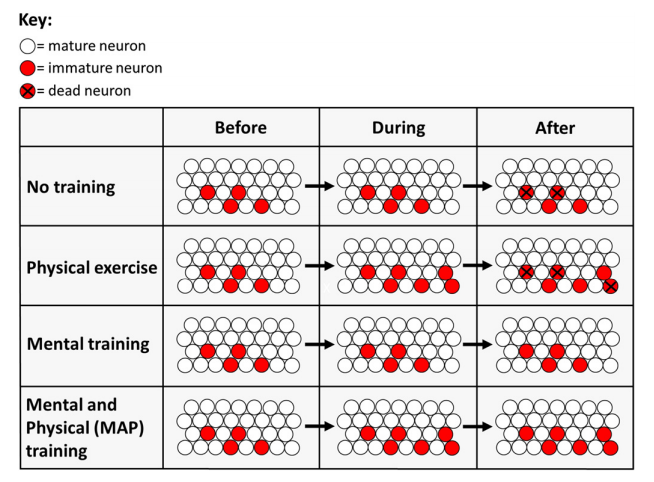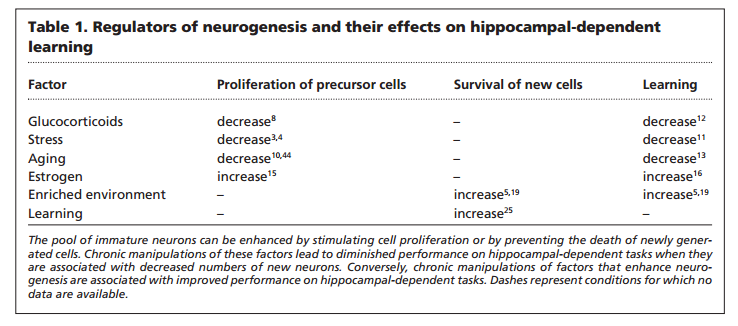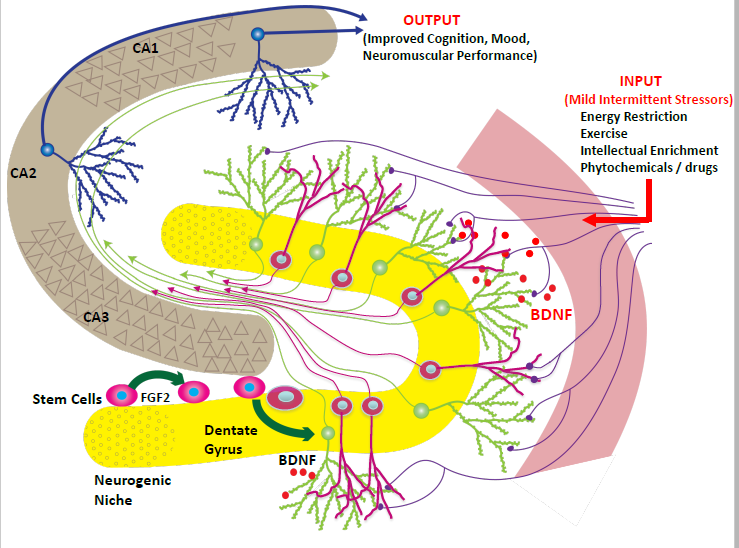In the previous message I posted a short explainer video about a powerful cross brain training strategy – combining aerobic exercise with mental training – either working memory training (e.g. HighIQPro) or focused attention (FA) meditation to achieve long-term cognitive gains from the growth of new brain cells in the hippocampus. In this post we look more closely at how to harness the hippocampus for better mental performance.
Hippocampal stem cells and the ‘learning window’
The hippocampus is critical for neuroplasticity in the adult brain – its ability to adapt and learn. It’s the most powerful motor for adult neuroplasticity that we have. There are two ‘hippocampi’, nesting close to the amygdala – one in each hemisphere. Each produces around 1000 new neurons each day in a healthy adult brain – throughout the lifespan. If you are doing aerobic exercise, this output can go up to several thousand.

This tells us that these new-born cells are designed to be available during a certain learning window – a limited period of time when we can ‘use them or lose them’.
Mental training capitalizes on this critical period, hard-wiring the new neurons.
From the work of Tracey Shors we saw that physical exercise and mental training work in different ways. While aerobic exercise grows new brain cells, mental training helps them survive, and there is a synergy effect – as shown in this diagram:


How do the new hippocampal cells help learning and IQ?
What kind of learning is the supply of new brain cells designed to boost? What is hippocampus-dependent learning?
1. Forming autobiographical and semantic (factual) memories
If the hippocampus is destroyed (e.g. through surgery or a stroke), the ability to form NEW episodic or factual memories is destroyed. Here is a short video of a man who has no functioning hippocampus. His working memory (mental workspace) functions over 10-20 seconds or so, but he is unable to transfer his experiences in the ‘bubble’ of the present into long-term memories. (It should be noted that his problem is not with ‘short term memory’ but with transferring the contents of short term memory – which are normal – to long-term memory.) Poor guy!
2. Chunking: Information compression
The hippocampus enables CHUNKING – reducing long strings of information that can be difficult to remember down into shorter, more manageable chunks. It enables us to make a new concept out of a conjunction of concepts that are already stored separately but not yet as a single concept in that combination.
This expands the effective capacity of our working memory – our ‘mental workspace’ – that widens the bandwidth of what we can process, increasing our comprehension and cognitive performance. Anything we learn (e.g. musical instrument, martial arts, subjects like physics and math) involve learning areas in small chunks till we master and internalize a chunk and then proceed to the next. The process of learning chunks (e.g. a new concept or strategy) is enabled by the hippocampus.
3. Keeping chunks and memories distinct: Event file separation
 You’re in the shower and you shampoo your hair. Or did you? You’ve been in the exact same situation thousands of times – same sights, sounds, sensations, actions. But you remember the act of shampooing – just THEN. Previous shampoo-events don’t interfere with your memory of this event.
You’re in the shower and you shampoo your hair. Or did you? You’ve been in the exact same situation thousands of times – same sights, sounds, sensations, actions. But you remember the act of shampooing – just THEN. Previous shampoo-events don’t interfere with your memory of this event.
Or you’re doing a breathing meditation exercise – you attend to your breath as you breath in and out, and count from 1 through to 10 after each breath cycle. Same breathing experiences, but you don’t lose count. Each breath is distinct as the current breath replaces the previous ones.
The hippocampus also enables us to encode similar experiences or events in different ‘event files’ depending on when they happened, or the wider context they happened in. Events with overlapping features are represented by distinct patterns of activity in the hippocampus – enabling them to be remembered without interference from previous, similar events. This is technically called ‘orthogonalization’.
This ability is critical to how our working memory keeps chunks of information free from interference from ‘competing’ information that is similar, allowing us to remember, problem solve, apply rules and reason cleanly and flexibly.
Building your hippocampal circuits: Exercise and mental training
OK – so these two functions of the hippocampus tell us how critical this hippocampal neuroplasticity mechanism is for learning and IQ.
If you’re doing aerobic exercise, you can pump out new hippocampal brain cells. And if – within a learning window that’s timed with your exercise – you’re intensively engaged in learning experiences involving chunking and slicing up your experiences into distinct events, you can hard-wire these neurons into effective brain circuits for better cognitive abilities.
Exercise is clearly beneficial for cognition, in that it greatly adds to the raw material for new memories, chunking and making distinctions.
But how does working memory brain training or focused attention meditation help?
Unlike learning a guitar or a new type of software application that are specific types of learning, mental training is designed to have GENERAL PURPOSE benefits for hippocampal function. It improves learning generally, across the board.
There are different ways that mental training achieves this which we’ll look at later more closely. One is by increasing attention control circuits that signal to the hippocampus to trigger its learning mechanisms. Another is to make hippocampal functioning more efficient by tuning and amplifying the electrical signalling rhythms that underlie the specific types of types of learning the hippocampus is good at.
Recommended brain cross-training program
Harnessing your hippocampus for optimal results takes a real commitment. This isn’t a quick nootropic fix, but has lasting benefits with no side effects.
Using a procedure already proven by Tracey Shors and her colleagues at Rutgers, I recommend the following kind of training program for optimizing hippocampus-based mental performance:
10 blocks of HighIQPro in the morning and 10 blocks in the late evening (approx. 15-20 minutes per session), 5 days a week for 6-8 weeks. A 30 minute run/swim/cycle (where you push yourself) either early morning directly after the brain training or sometime during the day two times a week for 6-8 weeks. This is the ideal time period for both completing the HighIQPro brain training program, as well as integrating fully grown hippocampus neurons into new brain circuits. After this period, you should notice clear improvements in the cognitive abilities that have been discussed here. The benefits will be reflected in IQ test performance.
That’s how you can harness the hippocampus for better mental performance.


